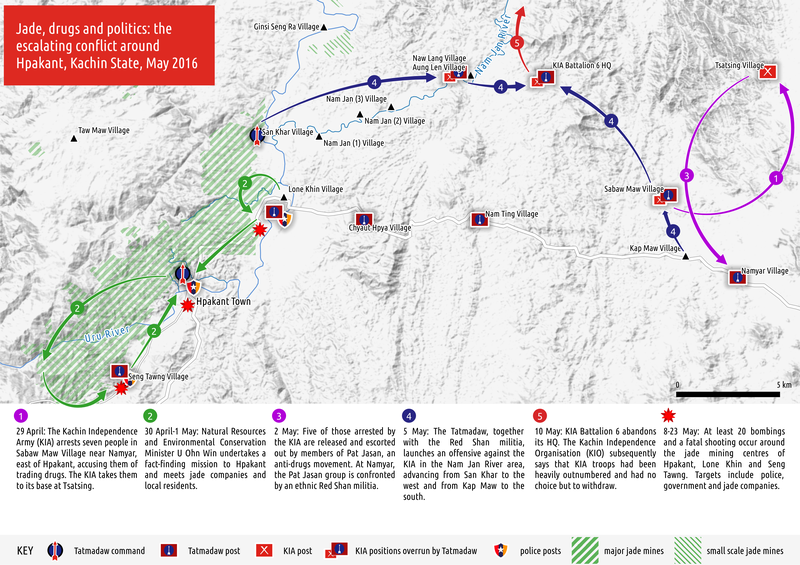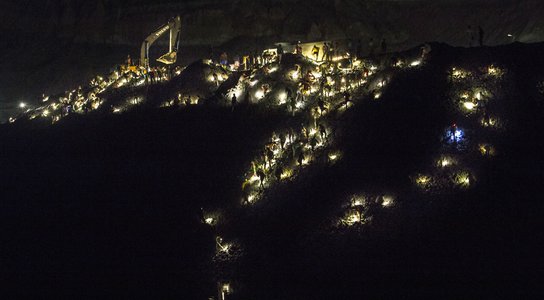This article also appeared in the Myanmar Times.
Delivering peace in Myanmar is the top priority of the country’s first democratically elected government in over 60 years. A close analysis of the recent spike in fighting in northern Kachin State shows that won’t be possible unless those at the table tackle the role of natural resources, particularly jade, in fuelling conflict.
A concerted drive for peace is exactly what Myanmar needs. The country has been riven by wars between central government and ethnic armed groups for the best part of seven decades. State Counsellor Aung San Suu Kyi’s new initiative is styled as a successor to the 1947 Panglong Conference which yielded an historic accord signed by her father Aung San and representatives of Chin, Shan and Kachin ethnic groups. The proposed “21st Century Panglong Conference”, scheduled for August, has great potential but will also face stiff challenges. Any negotiation will be as much about the political and economic agendas of the Tatmadaw (government army) as those of the ethnic armed groups.
The jade business is fuelling conflict
This is where jade, Myanmar’s most valuable natural resource, comes in. Jade production in 2014 was worth up to US$31 billion, equivalent to nearly half of the entire country’s GDP. Almost all the jade comes from Kachin State, but the local population sees practically no benefits. At the same time, Kachin is the scene of the country’s most serious armed conflict, which has killed thousands and displaced over 100,000 more. This is not a coincidence. While there are certainly other factors driving the violence, Global Witness research has shown that jade provides both sides – the Tatmadaw and the Kachin Independence Organisation / Army (KIO/KIA) – with incentives and financing to carry on fighting.
Last year our report Jade: Myanmar's "Big State Secret" showed how many of the biggest licensed jade mining companies are controlled by the families of politically influential retired generals, not least former dictator Than Shwe. Working alongside them are army conglomerates such as Myanma Economic Holdings Limited. An equitable peace deal that enshrines the economic rights of people in Kachin State would mean such companies would have to pack their bags. Peace would also slash the income of Tatmadaw units based in Kachin State and their commanders, who operate a systematic extortion racket that gouges the jade business at every level but hits the smallest operators hardest.
It’s not just the Tatmadaw and military families that rely on jade for cash; taxing the jade business is the biggest source of income for the KIO. Many in Kachin State regard this as legitimate, but the KIO has its own corruption problems. Some of its top leaders, notably KIO Vice Chairman Nban La, have a personal association with the jade business that goes back decades and appears very much intact. The KIO is not transparent about what it does with the jade revenues, and has so far offered no plans or vision for what a reformed jade sector under a federal system of government might look like.
Meanwhile, locals’ share of the jade is the crumbs from the table. The sight of Tatmadaw companies robbing them of their best chance of a better future, while laying waste to the landscape, deepens the already acute resentment that underpins Kachin nationalism. The new government must ensure a fair share for ordinary Kachins and other ethnic groups living in Kachin State if it wants a lasting peace.
Recent fighting around the jade mines follows an established pattern
May’s escalation of fighting around Kachin State’s Hpakant jade mines shows clearly the threat the business, in its current form, poses to peace and to the authority of the new government. Was this, as the Tatmadaw claimed, a response to the unlawful detention of civilians by the KIA? Was it coincidental that the army’s offensive came just days after the new government asserted itself through a visit to the mines by Minister of Natural Resources and Environmental Conservation U Ohn Win?

What is clear is that the sequence of events, set out in the graphic above, follows a recognisable pattern. At a time of increased pressure on jade mining companies, the Tatmadaw seizes on a pretext to attack the Kachin Independence Army (KIA) base closest to the mines. Amidst the fighting that follows, bombs are detonated in and around the major jade mining towns of Hpakant, Lone Khin and Seng Tawng. Local people are displaced and terrorised and the prospects for peace recede.
Something
very similar happened at the start of 2015, when jade company operations were
getting into high gear following a two year mining suspension, and as the Thein
Sein government was weighing up an extension of jade firms’ mining licences. On
that occasion, the KIA detention of a Kachin State minister and police officers
south of Hpakant became the justification for a major Tatmadaw offensive
against its Battalion 6 base to the north. A series of bomb blasts followed for
which no one claimed responsibility.
Breaking the cycle
One of the main reasons the corrupt and militarised jade business is harming people in Kachin State and the country as whole is because it has been allowed to operate in the shadows. The real owners of the licensed jade companies are generally hidden behind proxies. With no transparency there is no chance of public accountability. Myanmar has an opportunity to change this through its participation in the Extractive Industries Transparency Initiative (EITI) – an international good governance scheme. So far EITI’s coverage of jade has been desperately weak, however. The new government should swiftly move to re-energise the EITI process, prioritising jade and the disclosure of companies’ payments, licences, contractual terms, and ultimate (‘beneficial’) ownership.
While greater transparency can go a long way, it will not be enough to disentangle the jade business from a decades-long war. This is why the government’s new peace initiative is so critical. The topic of revenue sharing has been broached in peace discussions in the past, but the devil will be in the detail. Discussion must focus on how the ownership, management and benefits of jade will be shared, as part of a comprehensive peace settlement in Kachin State, or it simply won’t work.
Reaching agreements on these issues will be time-consuming and complicated and the work needs to start now. The 21st Century Panglong Conference offers an excellent opportunity to kick start the process. In so doing, it can greatly increase the prospects of a lasting resolution of Myanmar’s most intractable conflict, and set out a path to a more peaceful and prosperous future for the next generation.


